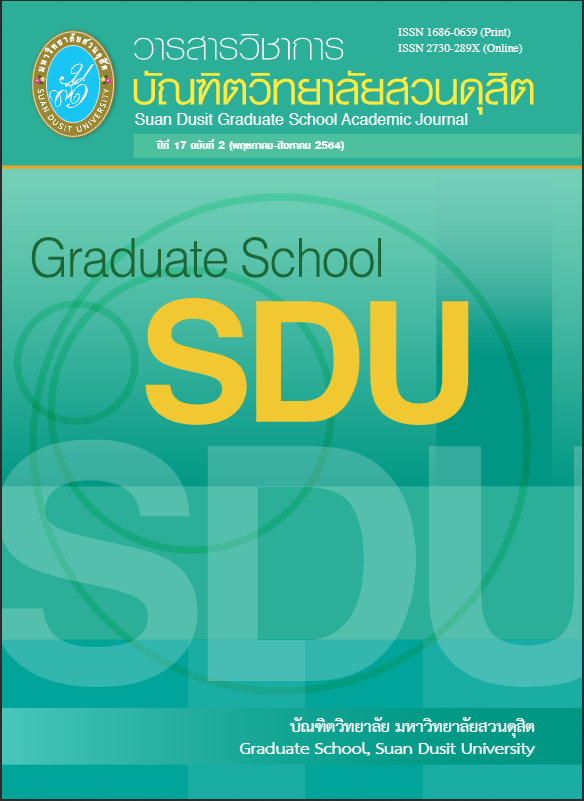The Development of Knowledge Management Model in Small Schoolsof the School Cluster 15 Under Bangkok Metropolitan Administration
Keywords:
A Development of the Model, Knowledge Management, School Cluster 15Abstract
The purposes of this research were to study the state of knowledge management, develop the knowledge management model, conduct a trial of the knowledge management model and evaluate the knowledge management model. This study was the mixed-method research including both quantitative and qualitative researches. The research tools were questionnaires and indepth interview. The content validity with IOC of 0.60-1.00 was verified by 5 expert with doctoral degree. These included 3 intructors in higher education, an academician and a school director. Quantitative data were collected from 14 teachers 92 students by using the questionnaire. The quanlitative data were collected by using in-depth interview with the Deputy Director of the school, 2 school board members, and 2 parent network committee. The model was developed and reviewed by 7 experts.
The model trial was conducted during the meeting of 15 key informants. The model evaluation was implemented by holding an academic conference with a school deputy director and 15 experimental teachers. Frequency, percentage, mean, standard deviation and summary of issue were utilized for data analysis. The results were as follows: 1) the overall state of knowledge management by teachers and students were at the high level. The results of indepth interview revealed that knowledge management might be new issue for teachers so they should try to understand and treat it not as a burden. 2) the knowledge management model with 8 fcators as mentioned was participatory and teamworking including setting goals of knowledge management, setting up required knowledge, knowledge acquisition, knowledge refinement, knowledge creation, knowledge sharing, knowledge utilization and knowledge asset creation. 3) according to the trial of 8 factors of knowledge management model, this enabled teachers to learn the guidelines of knowledge management based on 8 factors.4) the overall evaluation of the model was at the high level. (X = 4.29, S.D. = 0.66)
References
เครือข่ายโรงเรียนที่ 15. (2560), แผนพัฒนาคุณภาพเครือข่ายโรงเรียนที่ 15 พ.ศ. 2560-2563. กรุงเทพฯ:เครือข่ายโรงเรียนที่ 15.
เครือข่ายโรงเรียนที่ 15. (2561). รายงานการพัฒนาคุณภาพเครือข่ายโรงเรียนที่ 15. กรุงเทพฯ: เครือข่ายโรงเรียนที่ 15.
จารุวรรณ ฤทธิเพชร. (2552). กระบวนการและปัจจัยสำคัญแห่งความสำเร็จของการจัดการความรู้ของโรงเรียนสังกัดคณะกรรมการการศึกษาขั้นพื้นฐานในกรุงเทพมหานครและปริมณฑล: การศึกษาเชิงคุณภาพและปริมาณ วิทยานิพนธ์ครุศาสตรมหาบัณฑิต สาขาวิชาวิจัยการศึกษา คณะครุศาสตร์จุฬาลงกรณ์มหาวิทยาลัย.
ทัศนา หาญพล. (2557). แนวคิดและองค์ประกอบของกระบวนการจัดการความรู้, ประมวลสาระชุดวิชาการ จัดการความรู้หน่วยที่ 3. (พิมพ์ครั้งที่ 2) สาขาวิชาศิลปศาสตร์. นนทบุรี: มหาวิทยาลัยสุโขทัยธรรมาธิราช.
นฤมล สายะบุตร. (2553)) รูปแบบการจัดการความรู้สู่การเป็นองค์กรแห่งการเรียนรู้ในโรงเรียนสังกัดมูลนิธิแห่งสภาคริสตจักรในประเทศไทย. วิทยานิพนธ์ศึกษาศาสตรดุษฎีบัณฑิต, สาขาบริหารการศึกษาและผู้นำการเปลี่ยนแปลง มหาวิทยาลัยอิสเทิร์นเอเชีย.
นงนภัส คู่วรัญญ เที่ยงกมล. (2551). การวิจัยเชิงบูรณาการแบบองค์รวม. กรุงเทพฯ: สำนักพิมพ์แห่งจุฬาลงกรณ์มหาวิทยาลัย.
บุญชม ศรีสะอาด. (2556) วิธีการทางสถิติสำหรับการวิจัย เล่ม 1. (พิมพ์ครั้งที่ 5). กรุงเทพฯ: สุวีริยาสาสน์การพิมพ์.
พยัต วุฒิรงค์. (2552), การจัดการความรู้และวัฒนธรรมองค์การสู่ความสำเร็จ ใน เจษฎา นกน้อย และคณะ (บรรณาธิการ). นานาทัศนะการจัดการความรู้และการสร้างองค์การแห่งการเรียนรู้, (41-72):จุฬาลงกรณ์มหาวิทยาลัย.
พิภัช ดวงคำสวัสดิ์. (2557). "ความรู้เบืองต้นเกี่ยวกับการจัดการความรู้" เอกสารการสอนชุดวิชาระบบสารสนเทศเพื่อการการจัดการและการจัดการความรู้ หน่วยที่ 9. (พิมพ์ครั้งที่ 5). สาขาเทคโนโลยีสารสนเทศและการสื่อสาร นนทบุรี: มหาวิทยาลัยสุโขทัยธรรมาธิราช.
รัตนะ บัวสนธ์. (2550) ทิศทางและอาณาบริเวณการประเมิน (พิมพ์ครั้งที่ 2). กรุงเทพฯ: สำนักพิมพ์แห่งจุฬาลงกรณ์มหาวิทยาลัย.
วิจารณ์ พานิช. (2557). "การถ่ายทอดและการแบ่งปันความรู้" เอกสารการสอนชุดวิชาระบบสารสนเทศเพื่อการจัดการและการจัดการความรู้หน่วยที่ 12. (พิมพ์ครั้งที่ 5), สาขาวิชาเทคโนโลยีสารสนเทศและการสื่อสาร นนทบุรี: มหาวิทยาลัยสุโขทัยธรรมาธิราช.
สำนักการศึกษา. (2560), แผนพัฒนาการศึกษาขั้นพื้นฐานกรุงเทพมหานคร ฉบับที่ 2 (พ.ศ. 2560-2563).กรุงเทพมหานคร. (พิมพ์ครั้งที่ 1). กรุงเทพฯ: ชุมนุมสหกรณ์การเกษตรแห่งประเทศไทย จำกัด.
สำนักงานคณะกรรมการวิจัยแห่งชาติ. (2550), ตำราชุดฝึกอบรมหลักสูตร "นักวิจัย" (พิมพ์ครั้งแรก).กรุงเทพฯ: ชุมนุมสหกรณ์การเกษตรแห่งประเทศไทย จำกัด.
สำนักงานเลขาธิการสภาการศึกษา. (2561) การพัฒนากลไกขับเคลื่อนระบบการผลิตและพัฒนาครูสมรรถนะสูงสำหรับประเทศไทย, กรุงเทพฯ: พริกหวาน จำกัด.
สมชาย นำประเสริฐชัย. (2558) การจัดการความรู้, (พิมพ์ครั้งที่ 1). กรุงเทพฯ: ซีเอ็ดยูเคชั่น จำกัด (มหาชน).
อิทธิพัทธ์ สุวทันพรกูล (2562) การวิจัยทางการศึกษา แนวคิดและการประยุกต์ใช้ (พิมพ์ครั้งที่ 2). กรุงเทพฯ:จุฬาลงกรณ์มหาวิทยาลัย.
อุทุมพร จามรมาน. (2553). การควบคุม การวัดประเมินและการจัดการความรู้. คณะครุศาสตร์ จุฬาลงกรณ์มหาวิทยาลัย.
Guskey, T.R. (2000). Evaluating Professional Development. The United State of America:Crowin Press., Inc.
Karthikeyan, P. (2017). A Study of Effective Organizational Learning Though KnowledgeManagement Model. International Journal of Research in Commerce & Management. 8 (4), 34-36.
Roy, R. (2000). A Framework to Create Performance Indicators in Knowledge Management.Cranfield University in UK Department of Enterprise Integration. (Photo copies).
University, Cambridge. (2004). Cambridge Learner's Dictionary. (2 ed.). Cambridge University Press.
Downloads
Published
How to Cite
Issue
Section
License
Copyright (c) 2021 Suan Dusit Graduate School Acadamic Journal

This work is licensed under a Creative Commons Attribution-NonCommercial-NoDerivatives 4.0 International License.






